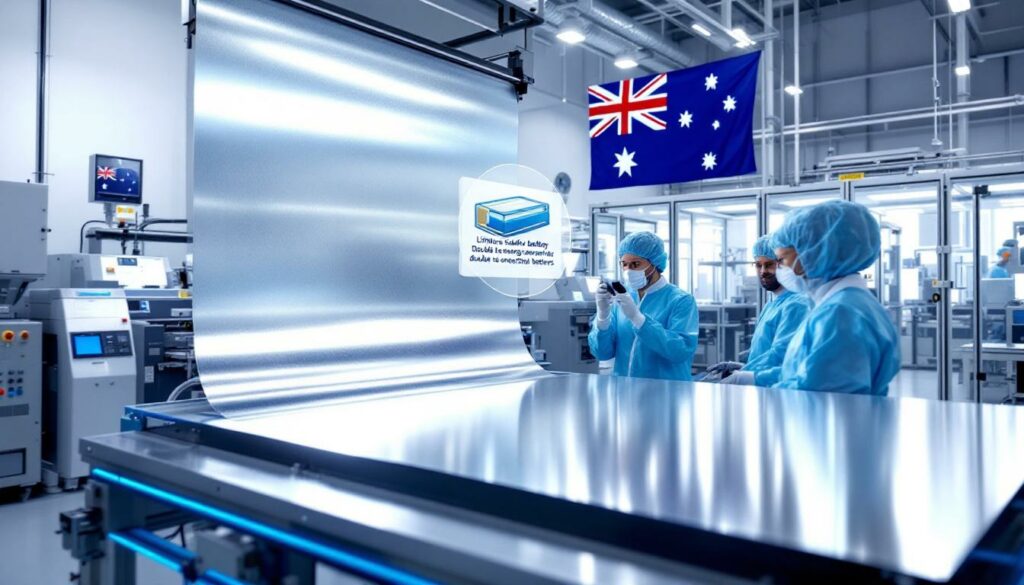What Are Lithium Metal Foils and Why Are They Important?
Lithium metal foils represent a revolutionary advancement in battery technology, consisting of ultra-thin sheets of pure lithium metal typically measuring around 100 microns thick. These specialized components serve as anodes in next-generation batteries, replacing the traditional graphite anodes found in conventional lithium-ion batteries. The significance of this material cannot be overstated—lithium metal has a theoretical capacity approximately ten times higher than graphite, enabling batteries to store substantially more energy in the same volume.
According to Dr. Lee Finniear, CEO of Li-S Energy, "This is a transformative moment for Australia's battery industry—we are proud to be the first company in the country to produce lithium foils, a critical component for the future of high energy density batteries."
Understanding Lithium Metal Foils in Battery Technology
The pure lithium metal composition of these foils is what makes them remarkable for energy storage applications. When integrated into lithium-sulphur and lithium-metal cells, they enable energy densities more than twice that of conventional lithium-ion batteries. This dramatic improvement stems from lithium metal's superior electrochemical properties, allowing for greater lithium-ion transfer during charge and discharge cycles.
The 100-micron thickness specification achieved by Li-S Energy represents an optimal balance between performance and manufacturability. Thinner foils would be more reactive and difficult to handle, while thicker ones would add unnecessary weight and reduce energy density advantages.
The Strategic Importance of Domestic Lithium Foil Production
Australia's position as a global leader in lithium resources creates a unique opportunity to establish sovereign manufacturing capabilities. Until now, the country has primarily focused on extracting and exporting raw lithium materials, capturing limited value from the battery supply chain. Domestic production of lithium metal foils changes this dynamic fundamentally.
By developing local production capacity, Australia reduces its vulnerability to international supply chain disruptions, enhances national energy security, and captures more value from its abundant lithium resources. This vertical integration represents a critical step toward establishing Australia as a complete battery technology producer rather than merely a raw material supplier.
"By reducing dependence on overseas supply chains, we substantially improve our cost base, enhance cell quality, and support the resilience of Australian manufacturing," notes Dr. Finniear, highlighting the economic and strategic benefits of this manufacturing breakthrough.
How Did Li-S Energy Achieve This Manufacturing Milestone?
The journey to producing Australia's first lithium metal foils involved significant technical innovation and strategic government partnership. Li-S Energy's achievement came ahead of schedule, demonstrating the company's engineering capabilities and commitment to advancing domestic battery technology.
The Technology Behind Li-S Energy's Lithium Foil Production
At the heart of this manufacturing breakthrough is specialized lithium extrusion equipment installed at Li-S Energy's advanced battery cell production facility in Geelong. This equipment enables the transformation of raw lithium materials into precisely controlled 100-micron thick pure lithium metal foils.
The manufacturing process requires exacting environmental controls due to lithium's high reactivity with oxygen and moisture. The company has implemented specialized handling protocols and production environments to ensure consistent quality while maintaining safety standards. While specific details of the proprietary process remain confidential, the extrusion technology represents a significant leap in Australia's battery manufacturing capabilities.
Government Support Through the Industry Growth Program
Critical to Li-S Energy's success was the $1.76 million Industry Growth Program (IGP) grant awarded by the Australian government in August 2024. This funding, provided as matched funding, accelerated the company's timeline for establishing domestic lithium foil production.
Dr. Finniear emphasized that "the successful delivery of this first phase of the IGP project sets the stage for Li-S Energy's next manufacturing expansion." This public-private partnership model demonstrates how targeted government investment can catalyze strategic industrial development, particularly in sectors with national security and economic sovereignty implications.
The grant's focus on establishing sovereign manufacturing capability reflects Australia's broader strategy of moving up the value chain in critical minerals processing and advanced materials production. By supporting local lithium foil production, the government is helping to create high-skilled manufacturing jobs while reducing dependency on overseas suppliers for crucial battery components.
What Makes This Achievement Significant for Australia's Battery Industry?
Establishing Australia's First Sovereign Lithium Foil Manufacturing Capability
The significance of Li-S Energy's breakthrough extends far beyond a single company's success. As Dr. Finniear stated, they are "the first company in the country to produce lithium foils," establishing a new sovereign manufacturing capability that has previously been absent from Australia's industrial landscape.
This achievement represents a crucial milestone in the country's journey toward becoming a more complete participant in the global battery supply chain. Rather than simply extracting and exporting raw lithium—allowing other countries to capture the value-added aspects of battery production—Australia now has the capability to transform its resources into high-value components essential for advanced energy storage.
The sovereign capability also enhances Australia's technological independence, providing a foundation for further innovation in battery technology and reducing vulnerability to geopolitical supply chain disruptions that have affected global industries in recent years.
Economic and Strategic Benefits of Local Production
Local production of lithium metal foils delivers multiple advantages that strengthen Australia's position in the rapidly growing battery market:
- Supply Chain Resilience: Reduced dependence on overseas suppliers mitigates risks from international shipping delays, trade restrictions, or geopolitical tensions
- Cost Advantages: Lower transportation costs and elimination of import duties improve competitive positioning
- Quality Control: Direct oversight of production ensures consistent material specifications and performance
- Manufacturing Ecosystem: Creates opportunities for related industries and suppliers to develop around this capability
- Export Potential: Opens new markets as international demand for high-purity lithium foil continues to grow
These benefits extend beyond purely economic considerations. As battery technology becomes increasingly central to defense applications, energy security, and transportation, having domestic production capability for critical components like lithium foils takes on strategic importance for national resilience.
How Will This Technology Transform Battery Performance?
Enabling Higher Energy Density Batteries
The most significant impact of Li-S Energy's lithium metal foils lies in their ability to enable batteries with dramatically improved energy density. The company's lithium-sulphur and lithium-metal cells offer more than twice the energy density of conventional lithium-ion batteries—a performance leap that could transform multiple industries.
This improvement stems from fundamental electrochemical advantages: lithium metal anodes can store significantly more lithium ions than graphite anodes, while the sulphur cathode in Li-S batteries has a much higher theoretical capacity than traditional cathode materials. The resulting cells can store substantially more energy in the same physical space, or deliver equivalent energy in a smaller, lighter package.
For context, while conventional lithium-ion batteries typically achieve 250-300 Wh/kg, lithium-sulphur cells can theoretically reach 500-600 Wh/kg or higher. This performance breakthrough could enable electric vehicles with double the range or half the battery weight—a transformative proposition for transportation electrification.
Applications and Potential Impact
The higher energy density batteries enabled by lithium metal foils could revolutionize numerous fields:
- Electric Vehicles: Extended driving range without increasing battery size and weight, potentially doubling current capabilities
- Portable Electronics: Smartphones, laptops, and wearables that operate for days rather than hours on a single charge
- Renewable Energy Storage: More efficient and compact solutions for storing solar and wind power
- Defense Applications: Li-S Energy has established defense collaborations to support military-grade battery deployment, where lighter, longer-lasting power sources provide tactical advantages
- Aerospace: Lighter batteries enabling longer flight times for drones and electric aircraft
Disclaimer: While lithium-sulphur technology shows tremendous promise, commercial applications at scale will require further development to address cycle life and manufacturing challenges. The performance metrics represent theoretical and laboratory achievements that may not immediately translate to all real-world applications.
What's Next for Li-S Energy's Manufacturing Expansion?
Planned Expansion of Production Capabilities
Li-S Energy's lithium foil production represents just the first phase of a more comprehensive manufacturing strategy. Under the ongoing IGP project, the company has outlined plans to significantly expand its capabilities beyond basic foil production.
The next steps in this expansion include installing specialized equipment to:
- Roll lithium foils to precise specifications tailored for different battery applications
- Laminate foils with other materials to enhance handling and performance characteristics
- Apply specialized coatings that improve safety and cycling stability
- Scale up proprietary nano-material coating technologies that address key performance limitations
These additional manufacturing capabilities will enable Li-S Energy to offer a broader suite of lithium metal products optimized for specific applications, from research-grade materials to commercial battery components. The company's focus on nano-material coatings is particularly significant, as these technologies can help overcome some of the historical challenges associated with lithium metal anodes, such as dendrite formation and reactivity.
Market Opportunities and Research Collaborations
In a strategic move to accelerate innovation and market adoption, Li-S Energy is actively offering its Australian-produced lithium metal foils to the broader research and development ecosystem. This includes:
- Universities conducting fundamental battery research
- Research institutions developing new energy storage technologies
- Private companies engaged in battery R&D and product development
- Potential commercial partners exploring advanced battery applications
This collaborative approach serves multiple purposes. It helps establish Li-S Energy's products as research-grade materials within the scientific community, provides valuable feedback for product improvement, and creates potential pathways to commercial partnerships and applications.
By positioning itself at the intersection of materials science, battery recycling breakthrough and manufacturing, Li-S Energy is creating opportunities to capture value across multiple points in the battery innovation cycle—from fundamental research to commercial deployment.
How Does This Development Fit Into Australia's Battery Strategy?
Advancing Australia's Position in the Battery Value Chain
Australia has long been a powerhouse in lithium resource extraction, holding approximately one-third of the world's lithium reserves and serving as a major supplier of raw materials to global battery manufacturers. However, the country has historically captured limited value from downstream processing and manufacturing—essentially exporting raw materials and importing finished products at much higher prices.
Li-S Energy's achievement represents a significant step toward reversing this pattern. By establishing domestic production of high-value lithium metal foils, Australia begins to move up the value chain, transforming its abundant natural resources into specialized products that command premium prices in global markets.
This vertical integration aligns perfectly with Australia's broader national strategy to develop sovereign capabilities in critical technologies and reduce dependence on international supply chains for essential components. The lithium foil production capability creates a foundation for further development of complete battery manufacturing within Australia, potentially transforming the country's role in the global battery metals investment landscape.
Supporting the Transition to Renewable Energy
The development of high-energy-density batteries using locally produced lithium metal foils supports Australia's broader energy transition goals in several ways:
- Enhanced Energy Storage: More efficient batteries improve the economics of renewable energy by addressing intermittency challenges
- Transportation Electrification: Higher-performance batteries accelerate electric vehicle adoption by addressing range and weight concerns
- Industrial Sovereignty: Reduced dependence on imported battery components strengthens Australia's energy security
- Skilled Employment: Creates manufacturing jobs in clean energy technologies, supporting economic transition
- Export Diversification: Provides opportunities to export value-added products rather than just raw materials
By establishing domestic manufacturing of advanced battery components, Australia positions itself to capture more value from both its mineral resources and its transition to clean energy. This development represents a strategic alignment of resource advantage, technological innovation, and Australia lithium innovations.
FAQ: Li-S Energy and Lithium Metal Foil Production
What makes lithium metal foils superior to conventional battery materials?
Lithium metal foils enable batteries with significantly higher energy density compared to conventional graphite anodes used in lithium-ion batteries. Pure lithium metal has a theoretical capacity approximately ten times higher than graphite, allowing for batteries that can store substantially more energy in the same volume. This translates to devices that can run longer on a single charge or achieve the same runtime with smaller, lighter batteries.
Additionally, lithium metal anodes operate at a lower voltage compared to graphite, increasing the overall cell voltage and further enhancing energy density. The 100-micron thickness achieved by Li-S Energy represents an optimal balance between energy density, handling characteristics, and manufacturability.
How does domestic production of lithium foils benefit Australia's economy?
Local production creates multiple economic advantages:
- Job Creation: Establishes high-skilled manufacturing positions in advanced materials processing
- Value Addition: Captures more value from Australia's lithium resources by moving up the processing chain
- Supply Chain Resilience: Reduces vulnerability to international shipping disruptions and trade restrictions
- Cost Reduction: Eliminates import costs and duties associated with bringing in finished lithium foils
- Export Opportunities: Opens new markets as international demand for high-purity lithium foil continues to grow
These benefits extend beyond Li-S Energy to the broader Australian economy, contributing to industrial capability, technological sovereignty, and economic diversification beyond traditional resource extraction.
What applications will benefit most from Li-S Energy's technology?
The most immediate beneficiaries will likely be applications where energy density is critical, including:
- Defense Technologies: Li-S Energy has already established defense collaborations to support military-grade battery deployment, where power-to-weight ratios provide tactical advantages
- Aerospace: Drones, electric aircraft, and satellite systems where weight savings translate directly to performance gains
- Electric Vehicles: Potential for extended range or reduced battery weight and cost
- Portable Electronics: Smartphones, laptops, and wearables that can operate longer between charges
The company's strategy of offering lithium foils to research institutions and potential commercial partners suggests a focus on fostering innovation across multiple application domains rather than limiting itself to a single market segment.
How does this development compare to international capabilities?
While several countries already produce lithium metal foils, Australia's entry into this manufacturing space is significant given its position as a major lithium resource holder. This vertical integration allows Australia to capture more value from its natural resources and establish a more complete domestic battery supply chain.
The achievement is particularly noteworthy as lithium foil production requires sophisticated manufacturing processes and strict environmental controls due to lithium's high reactivity. By developing this capability domestically, Australia joins a select group of countries with advanced battery material manufacturing expertise.
In the global context, this development represents an important step in diversifying the supply chain for critical battery materials beyond the current concentration in Asia, particularly China, which has dominated battery component manufacturing. This diversification contributes to global supply chain resilience for a technology that is increasingly essential to renewable energy adoption and transportation electrification.
Further Exploration:
Readers interested in learning more about advances in lithium battery technology can also explore Li-S Energy's ongoing work in scaling up proprietary nano-material coating technologies designed to enhance the performance and safety of lithium metal anodes in next-generation batteries, as well as stay updated on global lithium insights and lithium market insights that may impact the industry's future direction.
Looking to Invest in ASX Companies Developing Battery Technology?
Discovery Alert's proprietary Discovery IQ model delivers real-time notifications on significant ASX mineral discoveries, including breakthrough battery technologies like lithium foil innovations. Explore why these discoveries can lead to substantial returns by visiting the Discovery Alert discoveries page and gain your market-leading advantage today.




